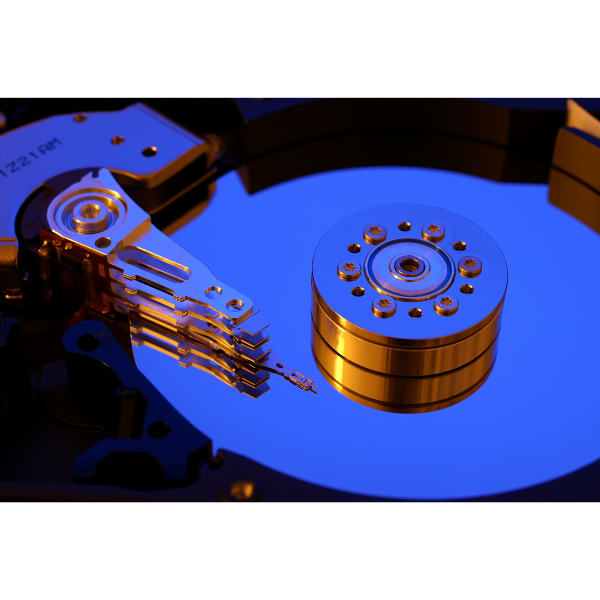The hard disk is a mechanical part that has moving parts, which means that parts of the disk are in movement all the time, which can generate some noise. In general, the sounds produced by the disk are similar to a low hum, especially when turning the computer on or off, as well as when recording or editing data.
However, sounds that are different from normal, such as crackling or scraping sounds, can indicate serious problems with the operation of the hard disk. So if you have heard loud or different noises coming from your disk recently, know that this is not a good sign.
The ideal in these cases is to make a backup of all your data and, if that’s not possible, seek specialist help. Not infrequently, when the disk fails, some data has already been lost and you may need a professional hard disk data recovery company to recover it.
There are a number of reasons why your disk may start to make noise. Some of these reasons may be easy to solve, others may indicate the end of the part’s useful life and the need to replace it with a new one. In this article, you’ll find out all about crackling disks and other noises!
Learn more about common disk problems and how to solve them.

Why the name “click of death”?
The name “click of death” is a term that became popular in the 1990s because it indicates a serious flaw in the disk, indicating that its “death” is near. The sound comes from the read/write head trying to read the data, failing and trying again. Each attempt is a click or pop, which is why the disk makes these sounds.
Not infrequently, this sound is the first sign that something on the hard disk is not right and will need to be replaced.
In these cases, it is important to back up your data as soon as possible and, if necessary, seek professional help to recover the lost data.
What causes the noise coming from the disk?
The causes of noises coming from the disk can be various and different causes can produce different noises. Understand:
Beeps
Hearing a single beep when you turn on your computer could be a sign that the motor that makes the disk platters spin is failing. When this happens, the system usually stops recognizing the disc as well.
Clicks
Hearing a clicking noise once in a while may be normal, but constant clicking can be a sign that there is a problem with the disk’s read/write head.
This sound can indicate constant attempts to restart the device after an error, which can damage the disk platters and lose data if it goes on for too long.
So if you hear constant clicking coming from your disk, turn it off as soon as possible to avoid further damage.
Snaps
Snapping can be a sign that the read/write head is moving unexpectedly, which usually indicates a serious fault with the device.
Metal chipping
This is definitely the worst kind of sound that can come from a disk, as it means that the read/write head has come into contact with the platters.
This is extremely damaging because the data is recorded on a magnetic layer on the surface of the platters, not on the core of the platters. So if the read/write head comes into direct contact with the platter, it will destroy that magnetic layer, destroying not only the recorded data but also the disk’s ability to store new data.
If this is the sound you hear when you turn on your computer, it is recommended that you turn it off immediately to prevent this problem from causing even more damage. If you have important data on this disk, you will need professional help from Bot to recover it.
Most common reasons for a disk making noise
Read/write head is stuck
The read/write head is like a mechanical arm that reads and writes data to the hard disk. It is a part that needs to move without difficulty in order for the device to function properly.
However, due to falls or impacts, this read/write head can get stuck in the disk platters, not only impairing the functioning of the device but also potentially damaging the data stored there.
Axle motor malfunction
The axle motor is the part of the disk that causes the platters to rotate, an essential movement for the proper functioning of the hard disk. However, it is not uncommon for this part to fail, leading to noises and failures when reading or writing data.
Cable or USB port broken
This type of defect is most common in external disks transported with the USB cable still connected to the device. Movement of the cable, as well as possible impacts and falls, can lead to damage to the cable or the USB port.
As a result, the disk does not receive the energy it needs to function properly, which can result in different sounds and malfunctions.
To discover if this is really the case, test the device with different cables.
If you are using other cables and the disk is showing other problems or asking to be formatted, check out our article on external disk asking to be formatted: how to solve it?
Complete disk failure
Unfortunately, the lifespan of a disk is not the best and a complete failure of the device can occur in a short time. If the disk makes noises and these are not justified by any of the above alternatives, a complete failure could be the reason.
If this is the case, it is time to change the disk. But before you do, it is important to make a backup of your data and, if data has already been lost, seek professional help to recover it.
How to recover a hard disk with a death click?
Generally, when a disk shows signs of failure, such as the click of death, it is difficult to repair because it is a mechanical failure. The best you can do is recover the data from the disk with the help of a specialist company like Bot.
In other words, it is nothing that can be recovered through software or anything like that. When a disk fails in this way, the only option is to change the device and if you have data, recover it with Bot. If you have made a backup, your data is safe.
What not to do with the hard disk?
Do not put your hard disk in the freezer
Many people think that freezing the disk will solve the problem. While heat is a real problem for computer parts in general, freezing the disk is not the right solution. Not to mention that if the disk is already failing, the last thing it needs is to be exposed to moisture.
Do not open the drive
As it is a very sensitive component, opening the disk yourself can make the situation worse. Opening the disk should be done in a clean room with the right tools to avoid further damage. Seek help from a qualified company to minimize the chances of damage that can be prevented.
Conclusion
While no computer is truly silent, the disk is one component you should pay close attention to. If you hear different noises from your disk than usual, make a backup as soon as possible and seek expert help.
If you need to recover data from a defective disk, talk to Bot. We have over a decade of experience in recovering data from defective disks and over 100,000 successful cases!


